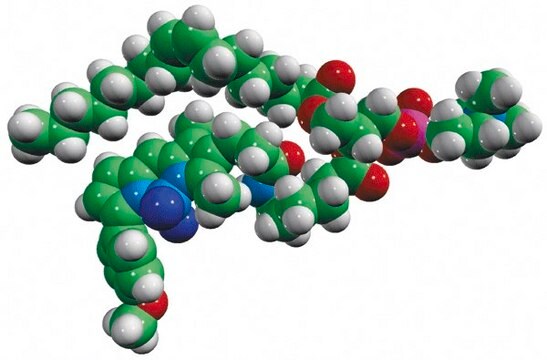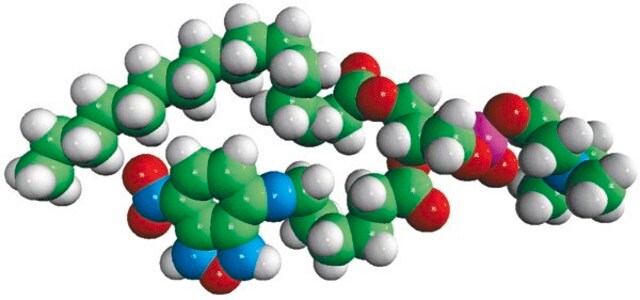810122P
Avanti
14:0-06:0 NBD PC
Avanti Research™ - A Croda Brand 810122P, powder
Synonym(s):
1-myristoyl-2-{6-[(7-nitro-2-1,3-benzoxadiazol-4-yl)amino]hexanoyl}-sn-glycero-3-phosphocholine
Sign Into View Organizational & Contract Pricing
All Photos(2)
About This Item
Empirical Formula (Hill Notation):
C34H58N5O11P
CAS Number:
Molecular Weight:
743.83
UNSPSC Code:
12352211
NACRES:
NA.25
Recommended Products
Assay
>99% (TLC)
form
powder
packaging
pkg of 1 × 1 mg (810122P-1mg)
pkg of 5 × 1 mg (810122P-5mg)
manufacturer/tradename
Avanti Research™ - A Croda Brand 810122P
shipped in
dry ice
storage temp.
−20°C
General description
Phosphatidylcholine (PC) is the most abundant phospholipid in eukaryotes and prime metabolite of glycerolipid metabolism. It is a vital component of the mucosal layer of the colon. NBD PC is a fluorophore with 7-nitrobenz-2-oxa-1,3-diazol-4-yl (NBD) labeled to the phosphatidylcholine.
Application
14:0-06:0 NBD PC may be used as a fluorescent marker in the preparation of hyaluronan (HA)-phospholipid medium for tribological studies against live cartilage. It might also be used as a substrate for type IV P-type ATPases (P4-ATPases), in the directed evolution approach to examine the molecular mechanisms of substrate backbone discrimination.
Biochem/physiol Actions
7-nitrobenz-2-oxa-1,3-diazol-4-yl phosphatidylcholine (NBD PC) functions as a fluorescent lipid analog, used in biological membranes to study various cellular processes. It plays a vital role as a strong bilayer-forming lipid.
Packaging
5 mL Amber Glass Screw Cap Vial (810122P-1mg)
5 mL Amber Glass Screw Cap Vial (810122P-5mg)
Legal Information
Avanti Research is a trademark of Avanti Polar Lipids, LLC
Storage Class Code
11 - Combustible Solids
Certificates of Analysis (COA)
Search for Certificates of Analysis (COA) by entering the products Lot/Batch Number. Lot and Batch Numbers can be found on a product’s label following the words ‘Lot’ or ‘Batch’.
Already Own This Product?
Find documentation for the products that you have recently purchased in the Document Library.
Teresa Veselack et al.
Lubricants (Basel, Switzerland), 6(1) (2018-03-13)
Pre-clinical testing of hemiarthroplasty devices requires that the tribological conditions present in vivo with live cartilage be closely duplicated. A current limitation in the tribological testing of live cartilage involves the use of cell-culture media as lubricant. to develop and
Bartholomew P Roland et al.
Proceedings of the National Academy of Sciences of the United States of America, 113(31), E4460-E4466 (2016-07-20)
Phospholipid flippases in the type IV P-type ATPase (P4-ATPases) family establish membrane asymmetry and play critical roles in vesicular transport, cell polarity, signal transduction, and neurologic development. All characterized P4-ATPases flip glycerophospholipids across the bilayer to the cytosolic leaflet of
Yi-Chih Lin et al.
Nature communications, 11(1), 230-230 (2020-01-15)
Annexins are abundant cytoplasmic proteins, which bind to membranes that expose negatively charged phospholipids in a Ca2+-dependent manner. During cell injuries, the entry of extracellular Ca2+ activates the annexin membrane-binding ability, subsequently initiating membrane repair processes. However, the mechanistic action of
Luís M S Loura et al.
Biochimica et biophysica acta, 1778(2), 491-501 (2007-11-21)
We present a combined theoretical (molecular dynamics, MD) and experimental (differential scanning calorimetry, DSC) study of the effect of 7-nitrobenz-2-oxa-1,3-diazol-4-yl (NBD) acyl chain-labeled fluorescent phospholipid analogs (C6-NBD-PC and C12-NBD-PC) on 1,2-dipalmitoyl-sn-glycero-3-phosphocholine (DPPC) bilayers. DSC measurements reveal that <1 mol% of
César Botella et al.
Progress in lipid research, 65, 12-23 (2016-11-23)
In plant cells, phosphatidylcholine (PC) is a major glycerolipid of most membranes but practically lacking from the plastid internal membranes. In chloroplasts, PC is absent from the thylakoids and the inner envelope membrane. It is however the main component of
Our team of scientists has experience in all areas of research including Life Science, Material Science, Chemical Synthesis, Chromatography, Analytical and many others.
Contact Technical Service








